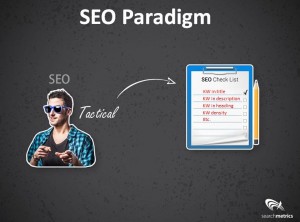You can’t deny that SEO – both as a practice and as an industry – has gotten a bad rap over the past few years. In fact, some would say that SEO has never had a great reputation, even in its heyday. I think there has always been this idea that somehow SEO is just a TINY bit unethical, or too focused on rankings, or that it isn’t quite focused enough on real people.
And while there have always been SEO’s who have attempted to game the system, the majority – especially since Panda – are genuinely interested in an alignment between usability and rankings.
A letter written to SEOMoz (now Moz) way back in 2005 provides a good picture of the SEO dilemma:
“SEO is only really legitimate when it’s the people running the search engines doing the optimisation. If SEO people didn’t try to play their algorithms, they’d have a lot more success at delivering good results to searchers.”
(P.S. This was written by an SEO!).
This struggle between rankings, optimization and user experience is clearly nothing new. So this dilemma begs the question:
Do we need to rebrand S.E.O.?
Or is this brouhaha all semantics?
Search Engines Don’t Buy Products, People Do!
Over the past few years, the term search experience optimization (SXO) has come up with some regularity. Perhaps one of the most notable references was Ben Potter’s 2012 article on the Econsultancy blog, SEO: Search Experience Optimization.
His article opens with a killer quote that, for me, precisely summarizes why there’s a movement afoot to rebrand SEO: “For me, the term search engine optimisation (SEO) has always been fatally flawed. It suggests that we optimise solely for search engines. However, search engines don’t buy products, people do.”
Potter suggests that SXO is simply the intersection of search engine optimization and conversion rate optimization. He argues that by providing a great user experience, you win over customers and increase leads and sales (you can’t argue with that.)
Best Possible Experience For Their Subject — The Visitor
Marketer Jenny Halasz wrote a piece in 2013 that suggested an alternative acronym for SEO: Subject Experience Optimization.
She wrote, “Instead of thinking of “marketing,” which is defined as the act of promoting and selling products or services, SEOs need to be thinking about how they can deliver the best possible experience for their subject — the visitor. What combination of elements do they need to present to make the user experience most optimal? What key actions do people want to take on the website, and how can we appeal to their base instincts and language with clear headlines and copy?”
Purpose: Amazing User Experience
In its purest form, SEO has always been about providing an amazing user experience. While black hat marketers were busy trying to create and structure content for the sole purpose of snagging search traffic – with little or no regard to user experience – ethical marketers have always worked hard to provide stellar content that also ranked well.
So, what does Google think about this move to rename SEO? According to Matt Cutts, using a term like search experience optimization may be an effective way to differentiate old-school ‘gamers’ and legitimate, white hat marketers. He suggests some factors that make up a great search experience: “Would users like to see the snippet on the page? Once they land, do they convert well? Are they happy? Do they want to bookmark it, tell their friends about it, come back to it?”
The way I see it, search experience optimization is in fact a new name for legitimate search engine optimization. And in fairness, the vast majority of SEO’s I’ve worked with in recent years have always had this user-first mentality; even when it wasn’t on trend.
In other words, most marketers won’t do anything differently by adopting an SXO strategy. It’s only the old-school gamers that will need to keep up.
The Real Way is to Learn from Mistakes
It wasn’t always the case where I thought about the user first. When I started SEO in 2000, websites were mostly ugly or heavily loaded flash sites. So when I  was working on my own projects and in an agency on projects in very competitive markets, it was all about scaling and cheap content. From doorway pages to millions of landing pages I pushed to Google daily.
was working on my own projects and in an agency on projects in very competitive markets, it was all about scaling and cheap content. From doorway pages to millions of landing pages I pushed to Google daily.
Everything was more like a game to win in the SERPs and to get traffic. Links came from guest posts, forums, link exchange systems and of course strong page rank links from eBay actions. But with the success, other problems arise.
At the time, I was outranking brand sites on their brand terms. One brand ended up suing Google because 8 of my different sites were ranking on top positions for their brand name and their site was on position 9. Instead of calling me or investigating how I was doing this, they chose to spend money on a lawsuit (they lost). But when it became public and one of the largest IT magazines published the story in 2004, Google kicked all of my sites out of the index. Not just the sites where I was outranking brands, but all sites where I was the domain owner. Even my real projects which did not contain any spam.
After this incident I thought about SEO and what SEO really should be. And in 2005 I started with many real, user-centric projects that built the foundation for Searchmetrics.
The 4 Tenets of Search Experience Optimization
While I think Ben Potter’s definition of SXO is a good one – a cross between technical SEO and conversion optimization – I think explicitly addressing user experience is also important. SXO encompasses all aspects of the search experience, from beginning to end:
- How your content performs – beyond keywords: Does your content do a good job of meeting the expectations of searchers? Are you targeting not only single, high search volume keywords but really provide the most targeted information for your visitors? If so, your content will rank for more than just a few keywords but also long-tail, phrases and related search terms or even related topics.
- The experience your visitors have while on your site: How quickly does your site load? How easy is your site to navigate? How does it display on various devices?
- How your content meets the needs of its audience: Is your content high quality, and is it written in a way that addresses the specific needs of its target market?
- The optimization of your content: Do your on-page SEO elements accurately convey your topic? Or are visitors disappointed when they reach your site from the SERP’s? Does Google know what your content is about?
Let’s break down each of these 4 tenets to see how they relate specifically to providing an incredible search experience.
1. Topical (Keyword) Research Based on User Intent
Pre-Panda, it was much more common for sites with low-quality content to rank for their chosen keywords. Sites could slap up 300 words of text on a page, stuff it with keywords, and potentially rank in the SERP’s. The “one keyword – one landing page” approach resulted in much (nearly) duplicate content. Obviously, this provided a very poor user experience and did not match user intent.
Keyword research that informs and optimizes the user experience will focus  far more on specific aspects of holistic topics covering also long-tail queries that provide highly-specific information.
far more on specific aspects of holistic topics covering also long-tail queries that provide highly-specific information.
For instance, a detailed tutorial on baking cookies is much more likely to meet the needs of someone searching for ‘how to bake cookies’ than it is for someone searching for ‘cookies,’ or ‘cookie recipe.’ Obviously this strategy is also better for marketers, as longer, more specific queries are far more likely to convert.
2. Site Design Enhances Experience, Rather Than Hinders It
Optimizing the usability of your site is extremely important if you’re serious about SXO. If your site detracts from the user experience, not only are your visitors likely to be disappointed, they also won’t convert. Optimizing your usability will involve making sure:
- Your site loads quickly.
- It displays properly on all devices (i.e., you already have a responsive design, right?)
- Your navigation is clear and doesn’t contain any broken links.
- You have good flow throughout your site: Strong calls to action on each page, helpful internal linking, etc..
- Your information structure makes sense to your visitors: Everything is where they would expect to find it.
- Your content’s readability level matches that of your target audience.
3. Content That Provides Exceptional Value to Its Audience
A major problem with the SEO of the early years was techy-types who were more interested (or at least more competent) in behind-the-scenes optimization strategies than in writing high-quality content.
With 86% of B2B marketers now using content marketing, content must be high-quality, must be original and must offer true value in order to stand out. Most topics have been written about hundreds or thousands of times before, so each new piece of content should meet one of the following criteria:
- Offers a new perspective on an existing topic.
- Details personal insights or experience.
- Curates existing content in a new, value-added way.
There is one important proviso I need to add here: The type of content you produce will vary depending on your audience. I know many business owners who have built a successful blog and social media presence offering content that has been done a thousand times before. The key to their success isn’t in providing a brand new perspective in each piece of content, it’s in having a keen understanding of their market and audience (plus: search intentions).
They write in such a way that their target market can really grasp the concepts, and they offer relatable examples. The topics and insights aren’t necessarily new, but the way it’s presented to the audience is spot on in terms of targeting and relevance.
4. Optimize Your Content For Readers and Search Engines
It’s easy to think of on-page SEO elements as being solely for the search engines. However, on-page SEO also helps provide an excellent user experience in that it summarizes and highlights the main topics of your page to your readers. Your headings break up long chunks of content into scannable segments; your title tags give readers a clear picture of what your page is about; rich snippets let searchers know exactly what type of content they’ll get when they click through to your site.
To optimize your content for both readers and search engines, focus on the following:
- Feel free to use your phrases and keywords in your URLs, title tags, headings, content and alt image tags (where appropriate.), but don’t focus too much on it
- Write a captivating meta description and use rich snippets to let readers know what you’re offering.
- Make your content as scannable as possible using bullets, lists, italics, and keep your paragraphs short.
- Write both long and short-form content: Longer, more comprehensive pieces of content tend to rank better, however short, actionable pieces are often easier for your mobile users to read ‘on the go.’
- Use font sizes that are big enough to view without pinching and zooming on mobile. Same goes for buttons and links: make sure they’re far enough apart that smartphone users can accurately click on them.
Now to answer the question….
I’m not sure that I’ve actually answered my original question: Is It Time to Rebrand SEO? I think one thing that has changed is the evolution of SEO from a tactical to a rather strategic approach.
I guess my answer would be this: While there’s no doubt that SEO is in need of some repositioning, I’m not sure a name change is the answer. Or, if we really want to work at managing the reputation of the practice and industry, (or simply want to convey the importance of user experience in search), maybe a completely new and different name and acronym are called for?
What are your thoughts? Is it time to rebrand SEO? If so, what name do we use that sufficiently conveys the user-first mentality we’re striving for?


